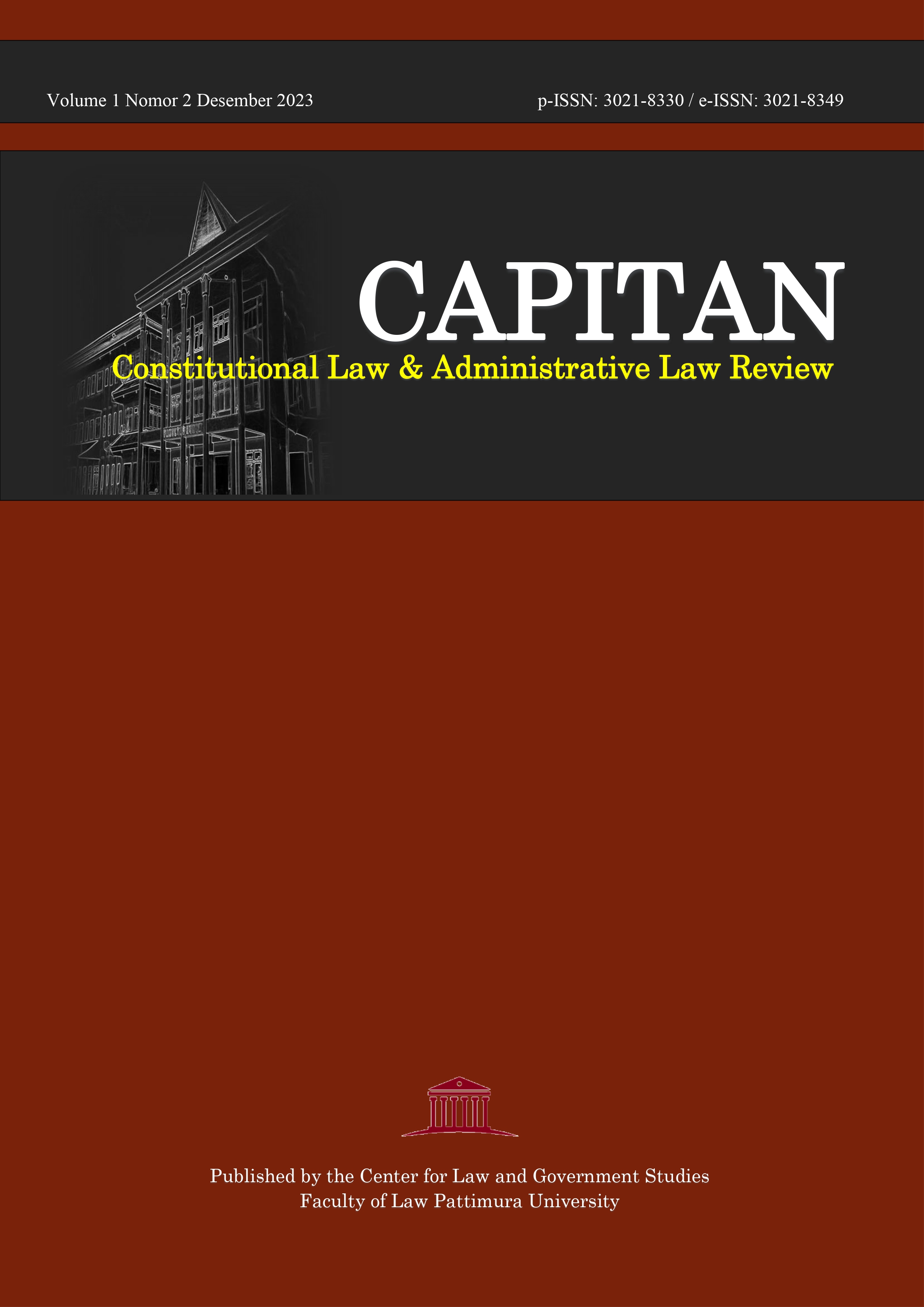Penegakan Hukum Terhadap Pelanggar Penggunaan Kendaraan Dinas
Abstract
Law Enforcement supervision of violators of official vehicle users by government officials is carried out based on the principle of decentralization where the Central Government fully delegates to Regional Governments to follow up or manage their respective regions. Any State/regional losses due to negligence, misuse or violation of law on the management of State/regional property are resolved through claims for compensation in accordance with laws and regulations. In responding to and avoiding the misuse of official vehicle facilities by government officials, it is necessary to supervise the use of official vehicle facilities. Supervision carried out on official vehicle facilities is intended so that government officials are aware of their responsibilities as servants of the state and society and do not attach importance to personal interests. The legal issues in writing are, first; What is the function of Government supervision of official vehicles ?. second; How are sanctions applied to violators of the use of official vehicles by government officials? The type of research used is Normative juridical research using a problem approach, namely a statutory approach and a concept approach. While the legal materials used are primary legal materials, secondary legal materials and tertiary legal materials. The technique of collecting legal materials through literature research with legal material analysis techniques is qualitative. Based on the results of research that violations of the use of official vehicle functions are still often encountered, due to the use of official vehicles are often used outside official interests. Violation of regulations and abuse of authority because it is not in accordance with the use and function of the official vehicle itself based on Government Regulation Number 28 of 2020 on Amendments to Government Regulation Number 27 of 2014 concerning Management of State/Regional Property and in accordance with Government Regulation Number 94 of 2021 concerning Civil Servant discipline. Government officials who misuse official vehicles may be penalized. Any party that causes losses to the State/Region for personal interests or for interests outside the functions of the position and service that can result in state/regional losses, may be given administrative sanctions and criminal sanctions.
Downloads
References
Jurnal
Penegakan Hukum Administrasi, Perizinan, Journal Law Review Volume I Nomor, 1 Februari 2019
Buku
Atep Adya Brata dan Bambang Trihartanto, Perbendaharaan dan Pemeriksaan Keuangan Negara, PT. Elex Media Kamputindo, Jakarta, 2005.
C.S.T. Kansil, Pokok-Pokok Hukum Kepegawaian Republik Indonesia, Pradnya Paramitha, Jakarta, 1979.
Irfan Fachruddin, Pengawasan Peradilan Administrasi Terhadap Pemerintah, Bandung: Alumni 2004.
Miftha Thoha, Manajemen Kepegawaian Sipil di Indonesia, Jakarta: Kencana Prenada Media Group, 2008.
Sri Hartini dan Tedi Sudrajat, Hukum Kepegawaian Di Indonesia (edisi kedua), Sinar Grafika, Jakarta, 2018
Sri Hartini, Setiajeng Kadarsih, dan Tedi Sudrajat, Hukum Kepegawaian Di Indonesia, Sinar Grafika, Jakarta, 2014
Tanti Kirana Utami, Dinamika Norma Hukum Aparatur Sipil Negara, Damera Press, Jakarta
Lain-Lain
Achmad Sudrajad, Perancang Peraturan Perundang-undangan Biro Hubungan Masyarakat, Hukum dan Kerja Sama Badan Kepegawaian Negara, Jakarta: Oktober 2022.
https://sippn.menpan.go.id/berita/37881/ bolehkah kendaraan-dinas-operasional-digunakan-untuk-kepentingan-pribadi / 2023 SIPPN - Kementerian Pendayagunaan Aparatur Negara dan Reformasi Birokrasi - Republik Indonesia
Copyright (c) 2023 Aswinda Nilam Sari, Dezonda Rosiana Pattipawae, Vica Jillyan Edsti Saija (Author)

This work is licensed under a Creative Commons Attribution-NonCommercial 4.0 International License.
Authors who publish their manuscripts in this Journal agree to the following conditions:
- The copyright in each article belongs to the author, as well as the right to patent.
- Authors are able to enter into separate, additional contractual arrangements for the non-exclusive distribution of the journal's published version of the work (e.g., post it to an institutional repository or publish it in a book), with an acknowledgment of its initial publication in this journal.
- Authors are permitted and encouraged to post their work online (e.g., in institutional repositories or on their website) prior to and during the submission process, as it can lead to productive exchanges, as well as earlier and greater citation of published work.
- Authors have the right to self-archiving of the article (Author Self-Archiving Policy)













